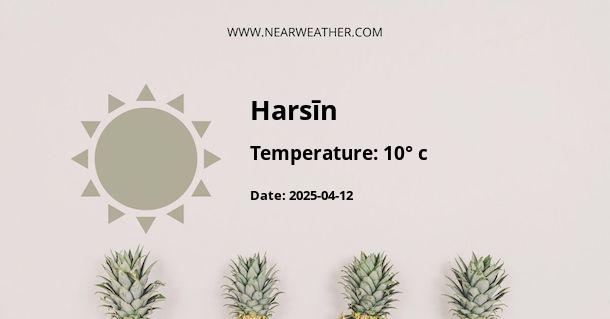Overview of Harsin, Iran
Harsin is a city in Iran, located in the Kermanshah Province. It is notably recognized for its rich historical background and diverse culture. However, one of its most distinguishing characteristics is its distinct climate, which plays a crucial role in shaping the city's lifestyle, economy, and overall appeal.
Climate of Harsin
The climate of Harsin, Iran, is classified as a cold semi-arid climate, according to the Köppen-Geiger climate classification system. This type of climate is characterized by hot summers and cold winters, with very little rainfall throughout the year.
Weather Patterns Throughout the Year
Understanding the weather patterns in Harsin throughout the year can provide valuable insight into the region's climatic conditions. The following sections delve into the year-round weather of Harsin, Iran.
Spring (March to May)
Spring in Harsin is marked by gradually increasing temperatures and occasional rainfall. The average high temperature in March hovers around 13°C (55.4°F), reaching up to approximately 23°C (73.4°F) by the end of May. Rainfall during this period ranges from 50 to 60 mm.
Summer (June to August)
Summers in Harsin are typically hot, with temperatures reaching up to 38°C (100.4°F) in July, the hottest month. Despite the high temperatures, rainfall remains minimal, averaging about 5 to 10 mm during these months.
Fall (September to November)
Autumn sees a drop in temperatures, with averages ranging from 33°C (91.4°F) in September to 18°C (64.4°F) in November. Rainfall begins to increase, particularly in November, marking the transition to winter.
Winter (December to February)
Winter in Harsin is cold, with temperatures often falling below freezing. The average high temperature in December is 8°C (46.4°F), which drops to a chilly 5°C (41°F) by February. Winter also sees the most rainfall, with monthly averages of 70 to 90 mm.
Impact of Climate on Local Life and Economy
The semi-arid climate of Harsin significantly impacts the local lifestyle and economy. The hot summers and cold winters shape the agricultural practices, with crops suited to these conditions, such as wheat and barley, being predominant.
The harsh weather conditions have also shaped the local architecture, with buildings designed to stay cool in summer and warm in winter.
The climate also influences the local culture, with festivals and events often centered around the changing seasons. For instance, the arrival of spring is celebrated with the Nowruz festival, a significant event in Iranian culture.
Conclusion
The climate and weather patterns of Harsin, Iran, play a crucial role in shaping the city's lifestyle, culture, and economy. While the semi-arid conditions may present challenges, they have also led to a unique adaptation, which is evident in the city's agriculture, architecture, and cultural practices.
References
- Köppen-Geiger climate classification system
- Climate-Data.org
- Iran Meteorological Organization
A - Harsīn's Latitude is 34.272099 & Longitude is 47.586102.
A - Weather in Harsīn is 5° today.
A - Climate Conditions in Harsīn shows light rain today.
A - Humidity in Harsīn is 91% today.
A - Wind speed in Harsīn is 14.72 km/h, flowing at 207° wind direction. today.
